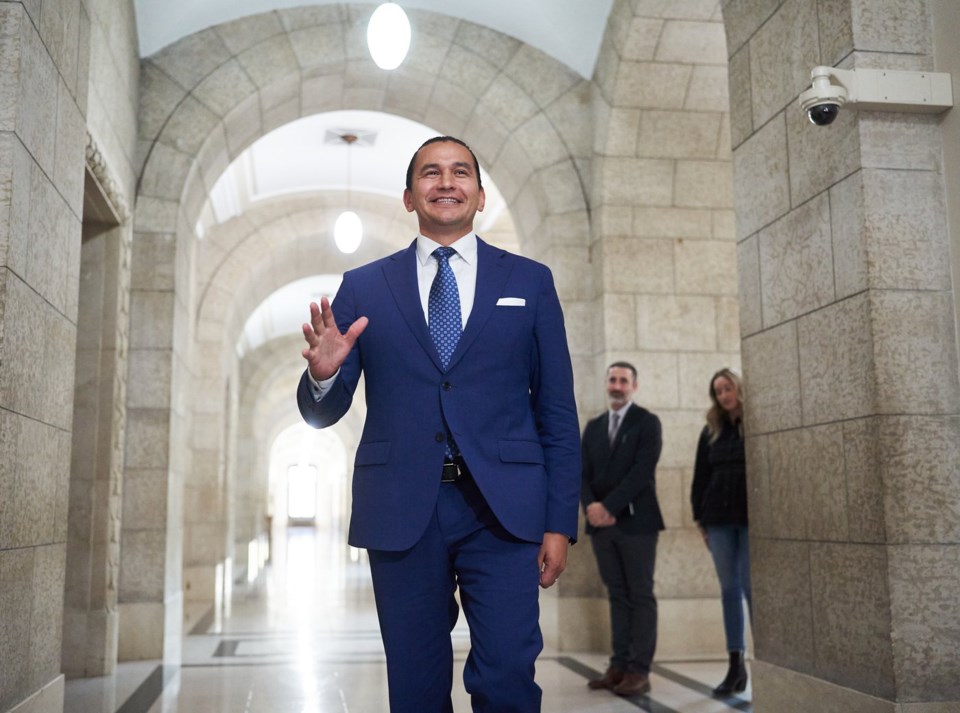WINNIPEG — Manitoba's NDP government, approaching the first anniversary of its election victory, is facing a fiscal squeeze as it tries to fulfil promises to cut living costs, give more money to public sector workers and eliminate chronic deficits.
Premier Wab Kinew says some fiscal restraint will be coming.
"I think the average Manitoban right now is looking at their family budget and they're making tough choices because of inflation about tightening the belt," Kinew said in an interview.
"And I think Manitobans should expect that their provincial government is going to be going through the same hard work so that we can deliver responsible government for you."
Having delivered on some tax-cut promises and spending commitments, the government is now working on issues including where spending can be contained.
"We basically reverse-engineer from there — how do we get to balance? And I can tell you that there's a significant amount of work being done … to articulate that path to balance," Kinew said.
A political analyst said the government will be hard-pressed to meet its campaign pledge to balance the budget in its first term, given its spending promises.
"They seem to want to be responsive to any group that comes along and says, 'We're experiencing economic hardship,' or 'We're entitled to more benefits than this.' So how they respond to the claims on the public purse and achieve a balanced budget by 2027 is hard to see at this point," said Paul Thomas, professor emeritus of political studies at the University of Manitoba.
The province has run deficits in every year but two since 2009. The former Progressive Conservative government ran small surpluses on two occasions, driven in part by wage freezes in the public sector and high net income at Crown-owned Manitoba Hydro.
But the Tories loosened the purse strings in their last two years in office before losing last October's election. The extra spending, combined with a downturn at Manitoba Hydro and a one-time, half-billion-dollar legal settlement over child welfare payments, created a large deficit for the NDP to inherit.
The NDP government fulfilled some election promises soon after the election that put more strain on the budget. It temporarily suspended the provincial fuel tax, which brings in roughly $340 million a year, and reached collective agreements with public-sector workers with substantial pay raises.
It has also promised to hire more health-care workers.
The government's path to balancing the books relies on keeping annual spending growth below 2.5 per cent. Some of the collective agreements with large unions, such as nurses and civil servants, contain wage increases higher than that.
All of those factors require looking for cost-containment in other areas, Kinew said.
"It is a challenge that we have to consider all these different variables, like who deserves what kind of raise, what health-care investment do we need to make (and) when, where do we need to tighten the belts," he said.
The government has had some help on the revenue side. Equalization payments from the federal government have jumped by 24 per cent this year, and the province is changing property tax rebates next year in a way that will bring in an extra $148 million — the largest tax hike in revenue terms in several years.
Inflation remains a challenge for the province.
The suspension of the fuel tax, which started in January and is set to run until the end of September or later, has led to Manitoba's overall inflation rate being among the lowest in the country every month. But inflation specific to items such as furniture, rent and food are running above the national average.
Kinew promised in December to take action if grocery stores didn't pass on savings from the provincial fuel tax holiday. Prices continued to rise and grocers said fuel is only one factor in shelf prices.
An economist with Statistics Canada said grocery prices in Manitoba, Saskatchewan and Alberta have been running higher due to factors such as high beef prices. Those prices are rising as a result of producers having reduced stock following a Prairie heat wave and high hay prices in 2021.
"And that's contributing to higher meat prices overall," said Andrew Barclay.
This report by The Canadian Press was first published Sept. 2, 2024.
Steve Lambert, The Canadian Press



